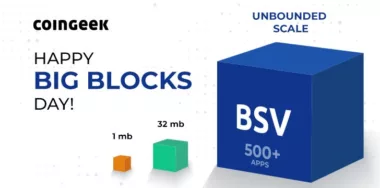Dr. Craig Wright, aka Satoshi Nakamoto, was recently interviewed by Adam Paigge of Supernova Labs. The interview covered central bank digital currencies (CBDCs), BSV blockchain, the importance of a scalable public blockchain, and more.
Dr. Wright affirms he is Satoshi Nakamoto
At the beginning of the interview, Dr. Wright reaffirms that he is Bitcoin’s inventor, Satoshi Nakamoto. He reminds us that he could have made much more money without the hassle had he just launched a blockchain, pre-mined a bunch of tokens, and “pulled a Vitalik.”
Instead, he has focused on making his invention work, scaling it, and has never been tempted to take the easy money. He’s 100% focused on Bitcoin and making it work.
An alternative to cash, mining pools, and more
Dr. Wright’s interviews always cover a wide range of subjects, and this one is no exception. Things kicked off with a discussion on pools, something Dr. Wright said he didn’t see coming. In pools, there’s one node, and contractors lend hash power to it. Dr. Wright says he should have seen this coming as Adam Smith covered specialization in his economic works.
Bitcoin creates an alternative to cash, Dr. Wright says. BTC, on the other hand, devalues the poorest people by making a system only the richest can use.
Who cares about moving $20 million for $2? Dr. Wright asks rhetorically. He created Bitcoin for people who make less than $2 per day. These people, typically living in underdeveloped countries, can also use the immutable ledger to build identity and prove ownership of things.
While Westerners see the fees and percentages on BTC, Ethereum, and other unscalable blockchains as reasonable, he points out that this is arrogant and shows a lack of awareness about how people around the world live.
On CBDCs and making sure they don’t lead to tyranny
Paigge pivots to the main subject: CBDCs. He asks Dr. Wright how they can be defined so the governments who issue them don’t have complete control.
Dr. Wright says they will bring back a cash economy but a regulated one. Things like VAT could be implemented automatically, dramatically simplifying things.
Paigge points out that “a watched population isn’t free.” Dr. Wright says it won’t be that easy to watch at scale. It’s unimaginable how many addresses can be generated, and since the BSV blockchain scales unboundedly, it’s possible to fan out UTXOs and spend small, casual amounts well under the AML/KYC limits.
In addition to this, we, the people, can also vote to build systems of checks and balances. What we need to return to is a small government that’s accountable. BSV blockchain can help with this by making everything traceable and creating accountability and controls that weren’t possible before.
What about the Chinese system? Dr. Wright says it’s centrally controlled, transactions can be reversed, and it won’t be long before the Chinese government rein it back in. If they don’t, they’ll lose control of their currency, which is a problem for their total grip on power.
Dr. Wright sees CBDCs helping the bottom 10%, even in places like the U.K. He reminds us that while London is rich, many other places in the country aren’t. We can empower people stuck at the bottom, giving them dignity and enabling them to make money via side gigs, hustles, and whatnot.
Bitcoin can help with this, too. It reduces friction, lowers fees, and makes smaller transactions possible. Building Teranode ensures we can scale, eventually leading to a system where everything talks (the Internet of Things). He likens Bitcoin to TCP/IP with a stable commodity at the base.
What about things like freezing orders, seizing orders, and the like? These can all be done with software, he says. After his court cases, all blockchains will have to adhere to court orders, and people like Vitalik Buterin will have to admit they lied and committed perjury.
To delve deeper into these and other subjects, check out the interview via the link at the top of the page. It’s an insightful interview with Satoshi himself!
To learn more about central bank digital currencies and some of the design decisions that need to be considered when creating and launching it, read nChain’s CBDC playbook.
Watch: Here’s how Bitcoin works as the base layer for other blockchains
New to blockchain? Check out CoinGeek’s Blockchain for Beginners section, the ultimate resource guide to learn more about blockchain technology.










